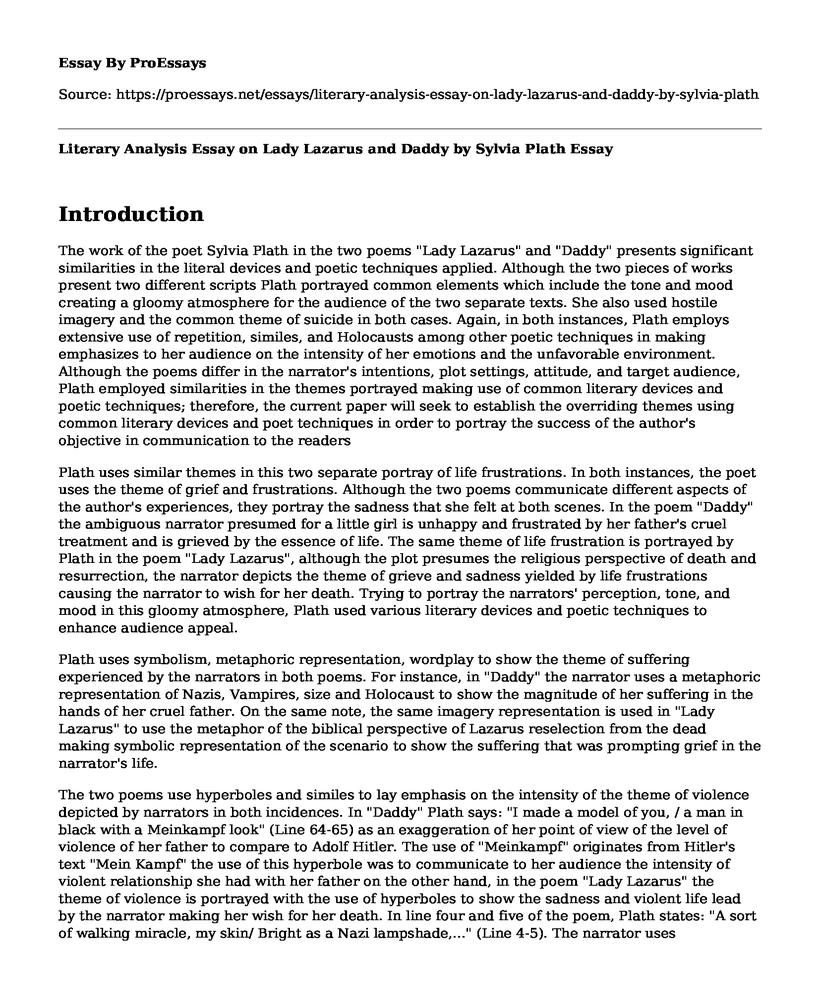Introduction
The work of the poet Sylvia Plath in the two poems "Lady Lazarus" and "Daddy" presents significant similarities in the literal devices and poetic techniques applied. Although the two pieces of works present two different scripts Plath portrayed common elements which include the tone and mood creating a gloomy atmosphere for the audience of the two separate texts. She also used hostile imagery and the common theme of suicide in both cases. Again, in both instances, Plath employs extensive use of repetition, similes, and Holocausts among other poetic techniques in making emphasizes to her audience on the intensity of her emotions and the unfavorable environment. Although the poems differ in the narrator's intentions, plot settings, attitude, and target audience, Plath employed similarities in the themes portrayed making use of common literary devices and poetic techniques; therefore, the current paper will seek to establish the overriding themes using common literary devices and poet techniques in order to portray the success of the author's objective in communication to the readers
Plath uses similar themes in this two separate portray of life frustrations. In both instances, the poet uses the theme of grief and frustrations. Although the two poems communicate different aspects of the author's experiences, they portray the sadness that she felt at both scenes. In the poem "Daddy" the ambiguous narrator presumed for a little girl is unhappy and frustrated by her father's cruel treatment and is grieved by the essence of life. The same theme of life frustration is portrayed by Plath in the poem "Lady Lazarus", although the plot presumes the religious perspective of death and resurrection, the narrator depicts the theme of grieve and sadness yielded by life frustrations causing the narrator to wish for her death. Trying to portray the narrators' perception, tone, and mood in this gloomy atmosphere, Plath used various literary devices and poetic techniques to enhance audience appeal.
Plath uses symbolism, metaphoric representation, wordplay to show the theme of suffering experienced by the narrators in both poems. For instance, in "Daddy" the narrator uses a metaphoric representation of Nazis, Vampires, size and Holocaust to show the magnitude of her suffering in the hands of her cruel father. On the same note, the same imagery representation is used in "Lady Lazarus" to use the metaphor of the biblical perspective of Lazarus reselection from the dead making symbolic representation of the scenario to show the suffering that was prompting grief in the narrator's life.
The two poems use hyperboles and similes to lay emphasis on the intensity of the theme of violence depicted by narrators in both incidences. In "Daddy" Plath says: "I made a model of you, / a man in black with a Meinkampf look" (Line 64-65) as an exaggeration of her point of view of the level of violence of her father to compare to Adolf Hitler. The use of "Meinkampf" originates from Hitler's text "Mein Kampf" the use of this hyperbole was to communicate to her audience the intensity of violent relationship she had with her father on the other hand, in the poem "Lady Lazarus" the theme of violence is portrayed with the use of hyperboles to show the sadness and violent life lead by the narrator making her wish for her death. In line four and five of the poem, Plath states: "A sort of walking miracle, my skin/ Bright as a Nazi lampshade,..." (Line 4-5). The narrator uses exaggeration to compare the Nazi and the Lampshade in order to demonstrate the state of violence in their lives. In both poems, though they are featuring very contrasting incidences, Plath's application of hyperboles show intact similarities.
Conclusion
In conclusion, the poems "Daddy" and "Lady Lazarus" by Sylvia Plath forms suitable literal platforms to show the use of literary devices and poetic techniques to present the themes that drive the works. Plath's skills in collective representation in poetry depict inspirational insight to the readers and others to learn from her pool of emotional differences to bring similarities in total contrasting incidences of literature.
References
Plath, S. Daddy, Retrieved from https://www.poetryfoundation.org/poems/48999/daddy-56d22aafa45b2 on 16th may 2018.
Plath, Sylvia. Lady Lazarus, Retrieved from https://www.poetryfoundation.org/poems/49000/lady-lazarus on 16th May 2018
Plath, Sylvia. Sylviaplath.de. 1963-02-11. Retrieved 2018-05-16.
Cite this page
Literary Analysis Essay on Lady Lazarus and Daddy by Sylvia Plath. (2022, Jun 04). Retrieved from https://proessays.net/essays/literary-analysis-essay-on-lady-lazarus-and-daddy-by-sylvia-plath
If you are the original author of this essay and no longer wish to have it published on the ProEssays website, please click below to request its removal:
- Critical Essay on Killer Angels by Michael Shaara
- Literary Analysis Essay on Standard Loneliness Package
- Critical Essay on Concept of Cultural Identity in a Raisin in the Sun
- Critical Essay Sample on The Open Boat: Nature's Inevitable Reign Over Human Destiny
- Essay Sample on Hamlet: Shakespeare's Timeless Tragedy of Revenge
- Gothic Elements in Faulkner's "A Rose for Emily" - Essay Sample
- Essay on Kincaid Jamaica's A Small Place: Critiquing Colonialism in Post-Colonial Antigua







